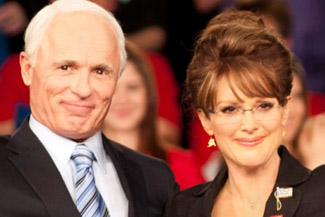|
|
All About Oscar: The Case for TV MoviesGame Change Proves That It's The Oscars That Need to ChangeBy Tom HousemanMarch 21, 2012
Last night I got around to watching Game Change, based on the book of the same title about the 2008 presidential election. While the book focuses mostly on the battle between Barack Obama and Hillary Clinton for the Democratic nomination, the film shifts the focus away from the Democrats to the Republicans. It explores John McCain's choice of Sarah Palin as his running mate, a choice that his campaign advisor Steve Schmidt helped him make, and the ways in which Palin both helped and hindered McCain's prospects. I suspect the decision to make the film mostly about Palin was partially because she is such a fascinating and contentious figure, and partially to invoke schadenfreude in HBO's liberal viewers. Palin, McCain, and Schmidt are played by Julianne Moore, Ed Harris, and Woody Harrelson, all of whom have been nominated for multiple Oscars, but none of whom have won. The film was extremely well received upon its airing on HBO, with much of the praise being directed towards Moore. Roger Ebert wrote that Moore “conveys the essence” of Palin, and Allessandra Stanley wrote in the New York Times that Moore “plays the candidate with surprising finesse. This is a sharp-edged but not unsympathetic portrait of a flawed heroine, colored more in pity than in admiration.” I could cut and paste more than a dozen other superlatives heaped on Moore (the film has a 74 on Metacritic) but you get the point, and if you've seen the film, I'm sure you agree. Moore gives quite possibly the performance of her career, at least on par with her Oscar nominated roles in Far from Heaven and Boogie Nights. I told a friend that I knew she was great because for the first time ever I actually felt bad for Sarah Palin.
|

|
|
|

|
Thursday, October 31, 2024
© 2024 Box Office Prophets, a division of One Of Us, Inc.


